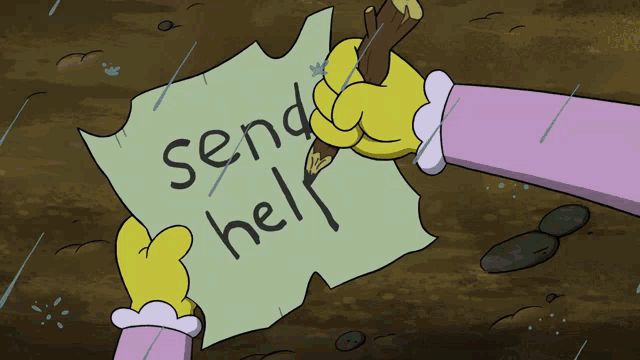Hello friends! It’s been awhile. Forgive our radio silence; both Kelsey and I ended up in the March from you-know-where. Whoever said the pandemic is over is definitely selling you something! In our hearts, our minds, our legs, and our abilities to multitask, it surely is nowhere near over.
Today, I’m bringing you the first of a two-part post, in which I share experiences I went through this winter as part of a co-teaching experiment that is currently funded by Western University’s Teaching Fellow’s program. Given MARCH (see above), I can preview this post by saying: it wasn’t a disaster, but it wasn’t WASN’T a disaster.
BUT: there’s always a silver lining, and in my books teaching isn’t worth doing if you can’t fail, and then get ready to re-up and fail better.
On the latter topic, look for part two of this post on Thursday, authored by my saviour/research fellow Stephanie Dennie. She’ll talk about the literature she read and the best practices she learned (and continues to develop) as part of our teaching team; she’ll also share her top tips for starting a co-teaching experiment of your own.
***
It’s mid-March. I’m in a classroom in a building I only just recently learned is located behind the parking lot where I occasionally leave my car when the parking lot I usually use at Western is full. There are students in an adjacent room trying to figure out how not to talk over one another so that they can get on the same page about what they are making, even though they are technically making two separate but related things. There are students in the room on the other side of the glass partition from me cooking along with gas, like they’ve always been besties and know exactly what’s the what. And then there are the students in front of me: the bulk of two classes, from my Theatre 2202 and my teaching partner’s Psychology 3895, fighting a civil war that’s just broken out over whether or not it’s OK for one group to use data collected by the other group to Do The Thing the course is designed to do: make a performance about experiences of homelessness and drug addiction in our city.
I stand to one side, next to a young Black woman who is itching to get a word in edgewise, my stomach doing tumble turns. Stephanie, our research fellow, steps in to try to reorient the conversation. No luck. Before the class ends, I have raised my voice in anger for the first time in my teaching career.
How the hell did I end up here??

For the past three years, I’ve been co-teaching a class with a colleague in Psychology – the thoughtful and kind Leora Swartzman – as part of an experiment in cross-disciplinary, community engaged learning. Our two classes – Performance Beyond Theatres (me) and Social Science in the Community (Leora) – are interested in making positive social impacts in our city (London, Ontario) using the tools our disciplines provide. We started out as a City Studio co-pro, but moved away from City Studio last fall to go it alone. Around the same time, I was fortunate to win a three-year fellowship appointment with our Centre for Teaching and Learning, and as a result we were able to hire research support to help us grow our ad-hoc experiment into something sustainable.
(Side note: I could have SWORN I’d written about this class before on the AC! I trolled – not that kind of trolling – through the archives from the start of our adventure to now, and found nada. I was shocked! But then I remembered our very first iteration of this project coincided with March 2020… and it all became clear. Any posts I’d considered about our collab were obviously eaten by the rabid COVID black hole.)
Leora and I fell ass-backward into this partnership initially. At our City Studio speed dating session in summer 2019, we both realized we wanted to work on the same community project – disseminating the City of London’s diversity and inclusion strategy. We teamed up via our community partner and got our hands dirty: Leora’s students did Psychology-side research with the City’s cultural ambassadors to develop an archive of work on sane-ism, ableism, racism and xenophobia in the city, while my students created performance actions to help illuminate and develop community understanding about these topics.

That first class iteration was not bad, though in hindsight the challenges we faced all paled in comparison with the challenge that was the onset of COVID about half way through the term; I’d be hard pressed to remember what was working and what wasn’t before we all got thrown into the Zoom room. (I will say that our students came up with some excellent projects despite the mayhem that was a global pandemic crashing at speed into their education; all the theatre students’ projects are archived here.)
In year two, we were working under semi-lockdown conditions, and my class was taught as a blend of online and in person (thanks to the amazing active learning space I’ve been blessed with throughout the last few terms). We suffered this time around, though, from the fact that my class was scheduled for fall rather than winter term (a pandemic compromise, alas), which meant that the collaboration my students and Leora’s students were meant to undertake – in which my students benefitted from over a term’s work of Leora’s students’ independent project research – got turned inside out. At the same time, Zoom wore on us: visits from community guests and partners were hampered by tech snafus, and communication problems created some hard feelings and required us to make difficult choices.
Going into year three, with the pandemic still raging, both Leora and I were a bit burned out. That’s when my fellowship provided us with an incredible blessing: the chance to hire a research fellow to help us figure out where we’d been, where we were going, and – crucially, as Stephanie will talk about on Thursday – why we’d decided this collaboration was a good idea in the first place. Realizing that we wanted to continue but weren’t really sure what we were trying to build, we knew we needed outside eyes and ears. We also knew we needed someone to manage the project and keep us on task for things like ethics applications – which were eating our brains, in particular Leora’s brain, even as we were trying to stay focused on the pedagogy part of the project. (In year two, so much of our time and effort went on admin that it’s no surprise the teaching-learning bits ended up tossed sideways.)

Stephanie arrived on the project in September 2021, and she has been that person we knew we needed and so much more. Throughout last term she observed both us and our students in action, collected weekly reflections in order to gauge what was working and what not working for everyone, and, finally, she helped Leora and I to realize what we hadn’t known we didn’t know.
The two of us, it turns out, came at this chance three years ago to orient our students together around shared social justice and community-engaged goals without knowing the basics about each other: who we were as teachers, what our styles of conflict management are, and what happens when we get into situations in the classroom that require on the spot power-sharing, collaboration, and compromise.
That’s our work for the summer: going back to square one with one another, as teachers and as people. In the process, we’re also going to work on interleaving our syllabi and assignments, figuring out a more capacious model for joint class work, and we’re both going to plan to share more and teach our own proprietary stuff less. But above all, the work is interpersonal: we need to know who we each are so that we can fully trust one another when the poop hits the thingy next time. We need to be willing to be vulnerable together – and to fail together, better.
